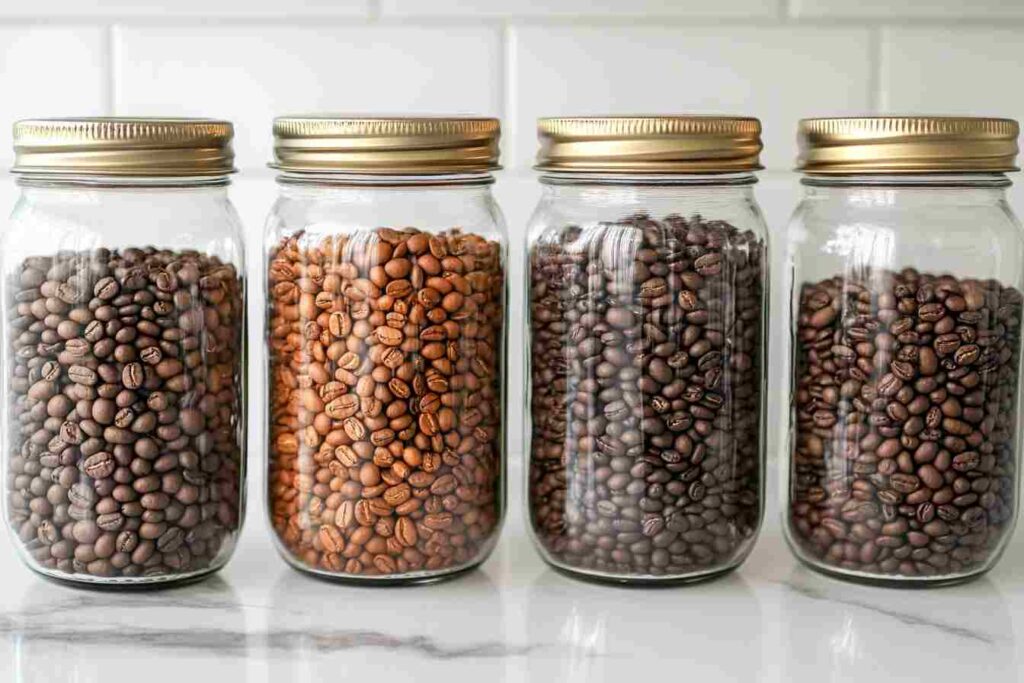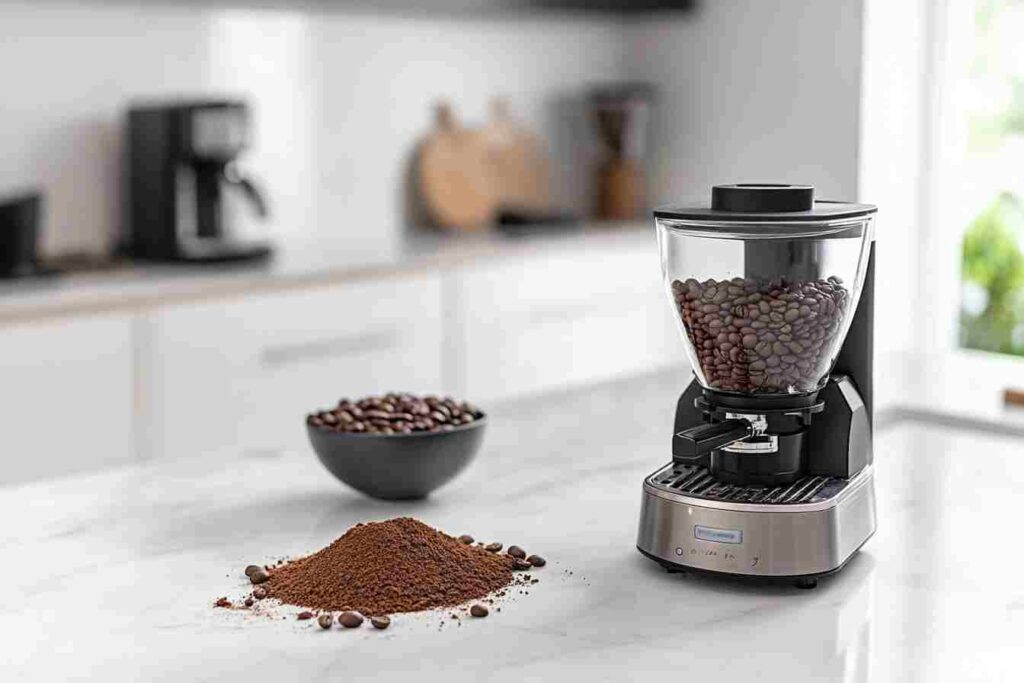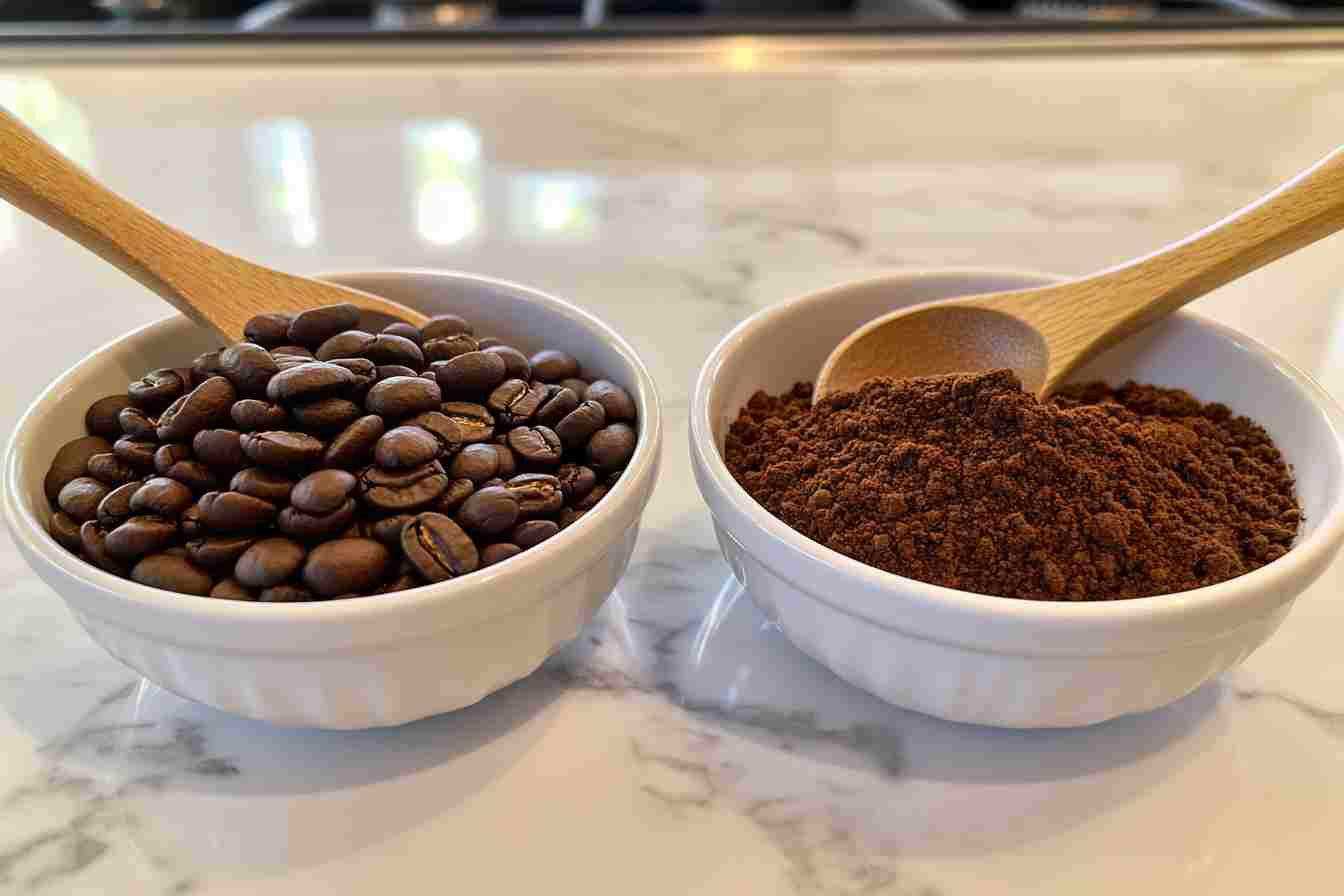Understanding the differences in whole bean vs ground coffee prices is essential for any coffee drinker trying to stick to a budget. Many coffee lovers wonder, is it cheaper to buy whole bean or ground coffee? Choosing between whole bean coffee and ground coffee can significantly affect your daily coffee budget. Therefore, understanding the cost differences is essential for any coffee drinker. This article will explore this question in-depth.
Understanding the Basics of Coffee: Beans vs. Ground
Before we dive into the cost analysis, let’s briefly discuss what we mean by whole bean coffee and ground coffee. Whole bean coffee refers to coffee beans that have been roasted but not yet ground. Conversely, ground coffee is simply coffee beans that have been pre-ground into smaller particles, making them ready for brewing. The primary difference is that you need a coffee grinder for whole beans. Also, the freshness of each differs.
Freshness and Flavor: The Key Differences
There are many factors to consider, but one of the biggest is freshness. Whole bean coffee typically retains its freshness for much longer than ground coffee. This is because the surface area exposed to air and light is significantly reduced. Therefore, whole bean coffee keeps its aroma and flavor longer. Once coffee is ground, it begins to lose its volatile compounds, leading to a duller taste. Therefore, if you prioritize the freshest possible cup, whole bean coffee is the best option.
Cost Analysis: Whole Bean vs. Ground Coffee
So, is it cheaper to buy coffee beans or ready-ground coffee? The answer is not always straightforward. Several factors affect the final cost. These include:
- Initial Price per Pound: Typically, whole bean coffee tends to be slightly more expensive per pound than ground coffee. This is because there’s less processing involved. However, there are exceptions depending on the brand, quality, and origin. For instance, specialty whole bean coffee will likely cost more than mass-produced ground options.
- Weight Differences After Grinding: Interestingly, the volume of whole bean coffee and ground coffee isn’t the same for a given weight. Therefore, when you grind beans, they generally occupy a slightly larger volume due to the increase in surface area. So a cup of ground coffee might use a few grams more than a cup prepared from the equivalent in beans.
- Shelf Life and Spoilage: As previously mentioned, whole bean coffee lasts longer than ground coffee. This means there is less potential for waste due to spoilage. However, you will need to use a coffee grinder if you opt for this option.
- Grinder Costs: If you choose whole bean coffee, you must factor in the cost of a good coffee grinder. This is an upfront cost. However, it may be an investment that pays off over time. Therefore, purchasing a coffee grinder is important for the long-term cost.
The Impact of Grind Size on Cost and Flavor

The way you grind your beans also affects the cost per cup. Different brewing methods require different grind sizes. For example, French press coffee requires a coarse grind. Conversely, espresso requires a very fine grind. A consistent grind ensures even extraction, maximizing the flavor and reducing coffee wastage. Therefore, the right grind size is important.
A Detailed Look at the Cost of Buying Coffee
Let’s look at some more details. What is cheaper, coffee grounds or beans in real-world terms?
- Mass-Market Brands: For standard, widely available coffee brands, the difference in price between whole bean coffee and ground coffee is often minimal, perhaps a few cents per ounce. However, these are usually lower quality beans. Therefore, the price saving might not be worth it.
- Specialty Coffee: With specialty brands, the difference tends to be more significant. High-quality whole bean coffee is more expensive. This reflects the higher quality of the beans and processing methods. In addition, you are paying for the increased aroma and flavor.
- Quantity and Bulk Buying: Buying in bulk can reduce the cost per pound for both whole bean coffee and ground coffee. However, bulk buying whole bean coffee is preferable due to the longer shelf life. Therefore, you should take storage into consideration.
- Storage Considerations: Proper storage is essential for both. However, whole bean coffee is more forgiving. This is because less surface area is exposed to oxygen. So, you are more likely to keep your beans fresh for longer.
Is it worth buying whole bean coffee?
The answer depends on your priorities. If you value the freshest and most flavorful coffee, yes, it absolutely is worth it. Whole bean coffee allows you to control the grind size and brew method. Additionally, you’ll avoid any pre-grinding flavor loss. However, if convenience is your top priority and you don’t mind a slight compromise on flavor, ground coffee is a suitable option. It may save you a few minutes in the morning.
Factors Influencing the Choice
There are a few more factors to take into account:
- Frequency of Coffee Consumption: If you drink coffee multiple times per day, investing in whole bean coffee and a grinder may be more cost-effective in the long run.
- Type of Coffee Maker: Your choice of coffee maker might influence your decision. If you use a French press, then whole bean will make the most sense. For drip coffee makers, either is fine.
- Taste Preferences: Those who appreciate the nuances of coffee will likely prefer whole bean coffee. This will allow more control over your coffee.
- Lifestyle and Convenience: If you prefer convenience and don’t have much time, ground coffee might be better. It is ready to use. However, it sacrifices freshness and flavor.
Nutritional Comparison of Coffee (per 8 oz cup)
Here is a table summarizing the nutritional content of a typical cup of black coffee. Please note that the nutritional values can vary slightly. It will change with the type of bean and the roast. The values below apply to both whole bean coffee and ground coffee, once brewed without any additions.
| Nutrient | Amount |
| Calories | 2 |
| Total Fat | 0g |
| Saturated Fat | 0g |
| Trans Fat | 0g |
| Cholesterol | 0mg |
| Sodium | 5mg |
| Total Carbohydrate | 0g |
| Dietary Fiber | 0g |
| Total Sugars | 0g |
| Protein | 0.3g |
| Caffeine | 95-200 mg |
| Potassium | 116 mg |
Brewing Considerations and Equipment
The way you brew your coffee also plays a role in the overall cost. Different brewing methods require different amounts of coffee. They can also impact the final flavor. Therefore, you should consider your brewing method. A French press uses more coffee than a pour-over. Furthermore, brewing methods with reusable filters reduce the long-term cost compared to methods using paper filters. So, your brewing method affects costs.
The Cost of Grinding Your Own Beans

One of the biggest differences is the cost of a coffee grinder. Although you might see a small price difference between buying whole bean and ground coffee, adding a grinder to your kitchen is an extra cost. However, the long-term benefits often outweigh the initial investment. A good burr grinder ensures a consistent grind, which leads to better extraction and more flavorful coffee. However, less expensive blade grinders tend to grind unevenly, leading to inconsistent results and potential waste. Therefore, investing in the right grinder matters.
The Importance of Proper Storage
Proper storage is vital for both whole bean coffee and ground coffee. This will ensure optimal freshness and flavor.
- Whole Bean Storage: Store in an airtight container away from heat, light, and moisture. Keep them in a cool, dark place.
- Ground Coffee Storage: Ground coffee is more susceptible to oxidation. Therefore, store it in an airtight container in a cool, dark place. Once opened, aim to use it within a week or two for the best taste. In addition, air, moisture and light are the enemy of ground coffee.
Environmental Impact
Another thing to consider is the environmental impact. Whole bean coffee, when ground at home, reduces the packaging waste associated with pre-ground coffee. Therefore, this makes it the more environmentally friendly option. In addition, you will not have to buy ground coffee packaging.
Does 1 tablespoon of coffee beans equal 1 tablespoon of ground coffee?
No, 1 tablespoon of coffee beans does not equal 1 tablespoon of ground coffee. This is because grinding increases the volume. Therefore, a tablespoon of ground coffee will weigh less than a tablespoon of whole bean coffee. So, they can’t be used in a 1:1 ratio.
Conclusion: Making the Right Choice for You
So, is it cheaper to buy whole bean or ground coffee? It’s clear that the answer isn’t black and white, so to speak. It depends on several factors. While whole bean coffee is often more expensive per pound, its longer shelf life and the ability to control freshness and flavor make it a worthwhile investment for many coffee lovers. However, ground coffee offers convenience at a slightly lower price point. Therefore, the right choice depends on your personal preferences, budget, and lifestyle. We hope this helps you make an informed decision.
Frequently Asked Questions (FAQs)
- Is it cheaper to buy coffee beans or ready ground coffee?
The initial price of whole bean coffee is often slightly higher than ground coffee. However, the longer shelf life of whole beans and their enhanced flavor may offer better value in the long run for frequent coffee drinkers. Therefore, if you drink a lot of coffee, beans will be cheaper overall. - What is cheaper, coffee grounds or beans?
Generally, the initial cost of coffee grounds may be less, but the price difference is usually minor. However, whole bean coffee typically provides better freshness, flavor, and less waste, which could make it more cost-effective for many individuals. - Is it worth buying whole bean coffee?
Yes, if you prioritize freshness, flavor, and control over the brewing process, whole bean coffee is definitely worth the investment. A coffee grinder may be required. However, the enhanced experience often outweighs the additional cost. - Does 1 tablespoon of coffee beans equal 1 tablespoon of ground coffee?
No, 1 tablespoon of coffee beans does not equal 1 tablespoon of ground coffee. When coffee beans are ground, they increase in volume because the grind creates more surface area. Therefore, a tablespoon of ground coffee will have a smaller weight. You can’t use them interchangeably in recipes. - Does the type of roast affect the cost difference between whole bean and ground coffee?Yes, the type of roast can influence the cost. Generally, lighter roasts tend to be less expensive. However, this depends more on the origin of the bean. Darker roasts, particularly those that are more labor-intensive, may be more expensive. However, this price difference applies to both whole bean and ground options. Therefore, the roast type is less of a deciding factor than whether you buy beans or ground coffee. The roasting process impacts the cost and flavor.
- If I only drink coffee occasionally, is it better to buy whole bean or ground coffee? For occasional coffee drinkers, ground coffee may be more practical because of its convenience. Whole bean coffee may go stale before you use all of them. Therefore, purchasing smaller quantities of pre-ground coffee might be better. This will help to minimize waste and keep costs down. However, remember to store your ground coffee properly.
- Does the quality of the coffee grinder affect the cost-effectiveness of buying whole bean coffee? Yes, the quality of your coffee grinder has a direct impact on the cost-effectiveness of buying whole bean coffee. A good quality burr grinder provides a consistent grind, ensuring a better extraction and maximizing flavor. A poor-quality blade grinder can result in uneven grinding and wasted coffee. Therefore, investing in a quality grinder will enhance your coffee experience and can save you money in the long run due to reduced waste.
- What are some tips for storing whole bean coffee to maximize freshness?
To maximize freshness, store your whole bean coffee in an airtight container. Keep it in a cool, dark, and dry place. Avoid storing your coffee in the refrigerator or freezer as condensation can ruin it. A pantry or cupboard is an ideal storage space. Using an opaque container is also beneficial to block out light. For extended storage, use a container that reduces oxygen exposure. Therefore, proper storage will ensure that your beans remain fresh for longer. - Can I save money by buying coffee in bulk, whether it’s whole bean or ground?
Buying coffee in bulk is often cheaper per pound than purchasing smaller quantities, for both whole bean coffee and ground coffee. However, bulk purchases are more suitable for whole bean coffee due to its extended shelf life. However, ensure you have proper storage to maintain freshness. Buying in bulk can save money. Yet, ensure you can use the coffee before it goes stale. - Are there any hidden costs associated with using whole bean coffee?
The primary hidden costs of whole bean coffee are the initial purchase of a coffee grinder, and potentially the cost of a scale to measure your beans for optimal brewing. However, these costs are one-time expenses. There might be a bit of a learning curve to determine the ideal grind size and coffee to water ratio. Therefore, these upfront costs are outweighed by the long-term benefits. The improved flavor and control offset the extra expense in the long run.
Related Topics to Explore About Coffee
Whole Bean Coffee – Link this when discussing the benefits of whole bean coffee.
Is Whole Bean Coffee Better? – Use this to elaborate on why whole bean coffee is often considered superior in freshness and flavor.
What is a Whole Bean in Coffee? – Add this link when explaining the basics of whole bean coffee.
Top Coffee in the World – Include this when mentioning premium coffee varieties that benefit from being purchased as whole beans.

